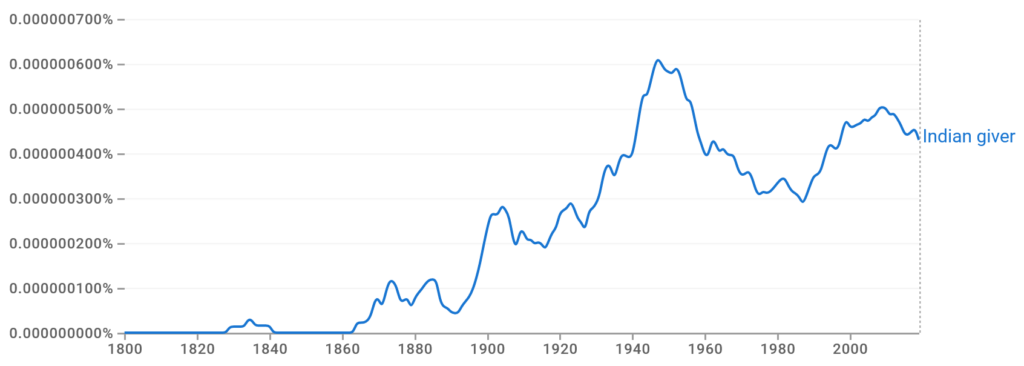An Indian giver is someone who gives a gift and later takes it back or expects something in return. This idiomatic phrase originated from cultural misunderstandings between settlers and Native Americans in the 18th century.
Despite the understood history behind the expression, it is commonly misused and wrongly assumed to be derogatory towards Native tribes. The term is now considered offensive and should be avoided.
Idioms like Indian giver have figurative meanings rooted in literal definitions. Understanding the historical context is crucial for informed use, promoting sensitivity and avoiding unintended offense.
This article explores the meaning, origin, and usage of the term Indian giver while providing alternative terms. Keep reading to expand your understanding of this idiom, and test your knowledge with a quick quiz at the end.

What Does the Idiom Indian Giver Mean?
The idiom Indian giver refers to someone who gives a gift and then later asks for it back or expects something of equal value in return.
Dictionary.com defines an Indian giver as “a person who gives a gift and then takes it back.” Similarly, Merriam-Webster defines it as “a person who gives something to another and then takes it back or expects an equivalent in return.”
However, this term, steeped in prejudice and cultural misunderstanding, is considered offensive today.
Variations of the Idiom
The most common variation of Indian giver is to turn it into a verb: Indian giving or Indian-give.
How Is Indian Giver Commonly Used in Context?
Modern uses of the expression are far removed from the idiom’s relationship with Native Americans. Due to human sensitivities, many people choose to highlight this connection rather than its connotative use.
When encountering the expression, consider its implications and context to avoid misinterpretations. In most cases, people may misunderstand the idiom due to a lack of knowledge about Native American cultures, assuming that it reflects their customs or traditions.
However, the term has no basis in Native American cultural practices and is solely rooted in cultural misunderstandings and colonial-era stereotypes.
What Are the Different Ways to Use Indian Giver?
Since the use of this term is discouraged, consider using related terms and phrases discussed below.
Where Can You Find Examples of Indian Giver?
Despite being somewhat taboo today, you may occasionally find the expression used in various sources. Common places include articles discussing its history and usage.
It also has historical references, regularly explained in context to highlight the changes various cultures have undergone over the last few centuries, such as an understanding of harmful stereotypes.
Here are some examples of its modern use in media and presentation:
- Earlier this week, TMZ.com asked Simpson if she would be taking back the expensive boat she bought for ex Tony Romo. Her reply? “I’m not an Indian giver.” (US Weekly Magazine)
- With that in mind, Iserhoff and fellow artist Sage Paul, a Dene designer from Toronto, are presenting Indian Giver, a curated multimedia art exhibition confronting the pilfering of indigenous culture head-on. (The Toronto Star)
What Is the Origin of the Idiom Indian Giver?

The actual origins of the idiom Indian giver can be traced back to 15th-century European settlers. David Wilton, a word historian, explains in his book “Word Myths: Debunking Linguistic Urban Legends” that the idiom was born of “cultural misunderstandings.”
Settlers, encountering Native Americans, perceived items given as gifts. Native tribes, lacking a monetary system, conducted trade via barter, expecting something of equal need or value in return.
Settlers misunderstood this, deeming the practice impolite. Indian giving eventually became an insult among children.
The first published reference to the idiom was documented in the mid-18th century by Thomas Hutchinson, who defined it as “a proverbial expression, signifying a present for which an equivalent return is expected.”
How Did the Idiom Evolve Over Time?
The expression has evolved away from the original stereotype it related to. However, despite people being aware of its history, misunderstandings still exist surrounding its use.
Although it is still a well-known and somewhat used phrase, its overall use has begun to drop off in recent years.
What Are Some Related Terms to Indian Giver?
To express the sentiment behind Indian giver without causing controversy, consider the following synonyms and antonyms. Use these in your sentences to convey the same idea without misunderstandings.

Synonyms
- Gives with one hand and takes away with the other
- Take-backer
- Gift rescinder
- Recalling donor
- Retracting benefactor
- Withdrawn giver
- Giving with strings attached
Antonyms
- Generous giver
- Selfless donor
- Altruistic benefactor
- Unconditional giver
- Open-hearted presenter
- Magnanimous bestower
- Self-sacrificing giver
Indian Giver: Test Your Knowledge!
Choose the correct answer.
Let’s Review
Indian giver is an idiom referring to someone who gives a gift but takes it back later. It is widely accepted as an offensive term due to its history, inaccurately portraying Native Americans as selfish due to cultural misinterpretations.
First seen in the 1700s in North America, the term Indian giver made its way into common English vernacular by the 1900s, eventually used mostly as a schoolyard taunt. Avoid its use to prevent anyone from misunderstanding your intentions. Instead, use a synonym such as conditional giver in its place.
